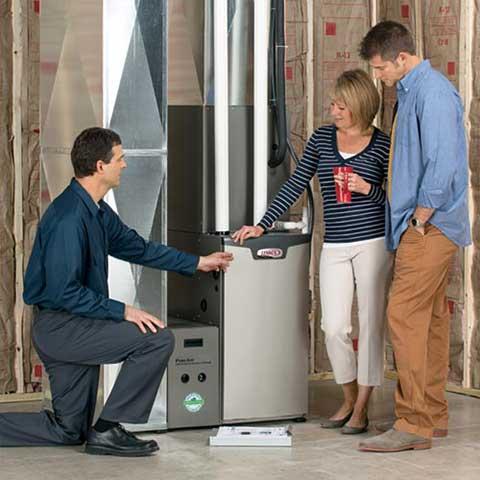Your central heating furnace has been providing you with years of energy-efficient performance, but perhaps it’s acting up lately. There are various signs by which we can tell if a furnace is malfunctioning, and most of these signs require us to have sharp eyes and ears. Then there’s the occasional furnace smell that we can pick up on.
Furnaces Can Smell
It makes sense that a furnace would emit certain smells. There’s the gas that it uses, which may smell like sulfur; that would be from an additional substance that the utility company added to the gas as a precaution. There are the mechanical components in the furnace, which, by generating heat, are liable to burn certain materials; you would, of course, recognize this by an unpleasant burning smell. The main question, then, is what each smell could signify and what you should do about it.
Here at Alaskan Air, we’re familiar with all the ways that a furnace can become dysfunctional. Let us come over to diagnose what’s causing the smell. We’ll then set you up for the appropriate furnace repair before the issue does any more harm to the system or to your health.
Furnace Smells and Their Causes
Below are the various smells that a furnace could produce, the possible explanations for them, and how to address them.
1. The “Rotten Eggs” Smell
The smell of sulfur, commonly described as being like rotten eggs, indicates a natural gas leak. As we said, the utility company adds a substance, a gas called mercaptan, to the odorless natural gas as a way for homeowners to know when there’s a gas leak. Mercaptan contains sulfur. The moment you smell this, shut off the furnace and call the gas company because a natural gas leak can cause a fire or explosion. Ventilate your home to remove the gas and evacuate your home if possible.
The number one cause of a natural gas leak is a cracked heat exchanger. Inside this component is a chamber where the gas combusts; the furnace blower sends air through the chamber, where it becomes warm and can circulate heat throughout your home. A leak, though, will let the gas out before combustion takes place. As for why the heat exchanger should crack, the answer is overheating. Dirty filters and vents, as well as anything else that restricts airflow, can build up heat in the heat exchanger, and it will crack as a result of the heat stress.
2. Burning Plastic Smell
Now we come to the many burning smells that you might experience. The smell of burning plastic can point to several things. First, it may be that the plastic casing on your electrical wires has melted. A short circuit could have generated such heat (assuming that the fuse didn’t blow), or there could have been a power overload.
Besides electrical problems, there’s another possible explanation: namely, that some foreign object has entered the furnace. For example, there have been cases of children’s plastic toys getting into furnaces and melting in the heat.
3. Burning Dust Smell
This is the most common burning smell, and you may smell it for a few hours if you’ve started up your furnace for the first time in months. The furnace is merely burning some of the dust that has collected inside of the heat exchanger and burners; it’s natural, and it poses no hazard to health, safety, or furnace operations.
Should the smell persist, though, it could point to an electrical issue, similar to the ones mentioned above. Electrical issues require immediate attention. After all, old wiring or a burnt-out fuse can start a fire if you’re not careful.
Another explanation for the odor would be a dirty filter. If you don’t replace the filter every 60 to 90 days like the HVAC experts recommend, this component will let dust, dirt, and other pollutants into your furnace. And so the furnace, in burning more dust and dirt, will emit that unpleasant smell for much longer than a few hours.
4. Burning Oil Smell
Like with the smell of burning dust, you may smell oil when you turn your oil furnace on for the first time each heating season. You usually smell it after having the oil refilled, too. A persistent smell of burning oil, though, could signify a cracked burner, through which fumes are escaping, or the presence of leftover oil after some failure in oil combustion. In such cases, one would do well to contact a professional for an inspection.
5. Metallic Smell
This odor will be similar to that of burning plastic, dust, and oil. The reason for a metallic smell may be an overheating metal or rubber component inside the furnace. Usually, when a furnace overheats, it will shut down prematurely as a safety precaution, so take note if the system isn’t cycling for long and isn’t heating your home sufficiently. And we recommend that you get regular maintenance because it can pinpoint what components are old and worn and need replacement or lubrication.
6. Gunpowder Smell
Yes, a furnace can give off a gunpowder smell, but don’t worry: it’s not dangerous in the way that the burning smell or the rotten egg smell is. Still, it’s a major concern; it means that either your circuit board has been fried or the blower motor has given out.
Both issues can be caused by dirt build-up and the restriction in airflow that it causes, so make sure you’re routinely changing your filter. Circuit boards can fry because of old or loose wiring, too. As for the blower motor, this can fail not just from dirt build-up but also from some electrical failure or a failure in the bearings. Replacing a blower motor isn’t cheap, and so many homeowners decide at such a point to replace their furnace altogether.
7. Musty Smell
If the furnace is smelling musty, then you can probably guess that it has something to do with mold. And it’s true that mold can develop in your air ducts if they haven’t been cleaned in years and if the furnace isn’t draining condensation properly. This draining problem may be due to a clogged condensate drain tube; the condensation that gets drained contains bacteria that can stick to the inside of the tube, creating a blockage. Another way that water might enter your furnace is if you have a whole-house humidifier that’s leaking into the furnace.
However, mold isn’t the only possible explanation. It could just be the smell of dust in your furnace. The filter in the return vent may be clogged with pollutants, or the evaporator coil may be covered in dust. If this is the case, then you’ll likely get the musty smell when starting up the furnace after a long period of inactivity. It won’t necessarily go away, though, unless you replace the filter and have a professional clean the evaporator coil.
8. Smoky Smell
Attached to your furnace is a flue, or exhaust vent, that vents the gases out through your chimney. Over time, the flue can become blocked, mainly by pieces of tile and mortar from the chimney, and this obstruction will force the gases into your ductwork, causing the smoky smell.
The moment you smell it, open your windows and call a technician to unblock the flue. You must do your part, though, and make sure to properly cap the chimney when appropriate; otherwise, when it rains, the water will only seep down and erode the inside of the chimney, creating another obstruction before you know it.
What Alaskan Air Can Do
At Alaskan Air, we can provide same-day service for most HVAC repairs, so rest assured that you won’t be left for long with that off-putting furnace smell. We’ve even made it our policy where customers don’t pay for our visit if we’re late. In fact, our team believes in showing up 10 minutes early to every appointment. Best of all, we don’t charge for after-hours or weekend service. After all, it’s not as if our clients choose the times when their furnace breaks down.
Let us diagnose the cause behind the smell and perform the appropriate furnace repair. First, you’ll get an accurate, up-front quote for the job with no hidden fees. We’ll then complete the work with your 100% satisfaction in mind. If you need a new furnace, we’ll install an energy-efficient one for your home and perform a total of five inspections afterwards for everyone’s peace of mind.
Alaskan Air has been in business since 1972, and we’ve stayed up to date on all advances in HVAC technology since then. It doesn’t matter what make or model your furnace is; we welcome them all. To learn more about what we do or to ask us whether a certain furnace smell is normal or not, call our friendly office staff today.


